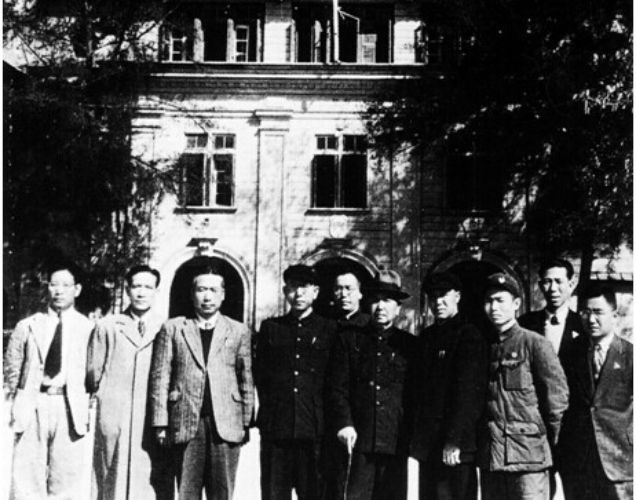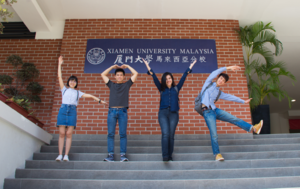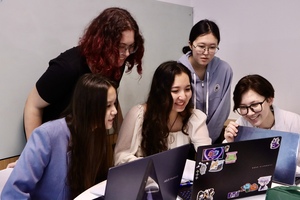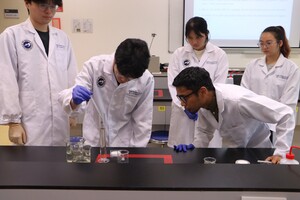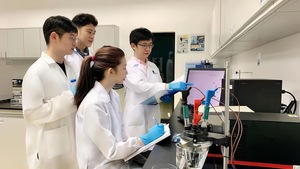- About
- Admissions
-
Academics
- Research & Innovation
- Campus Life
- Library
- More
Text
About the Programme
The Bachelor of Engineering in Computer Science and Technology (Honours) programme provides a strong foundation in mathematics, computer science, and computer systems engineering. It prepares students to meet the demands of the rapidly evolving technological landscape by developing both theoretical understanding and practical competence in algorithms, software development, and hardware systems.
Throughout their studies, students develop the technical expertise and analytical mindset required to design and integrate complex computing systems. They acquire proficiency in programming, data structures, algorithms, and computer architecture, enabling them to address real-world engineering challenges effectively. The curriculum emphasises the integration of hardware and software, the application of mathematical and algorithmic principles to problem-solving, and the use of modern tools to develop optimised and efficient computational solutions.
Graduates of the programme are capable of adapting to rapidly changing technologies and applying their skills to solve complex problems across diverse domains. They are prepared to contribute to industries embracing the Fourth Industrial Revolution (IR 4.0), where the convergence of artificial intelligence, automation, and data-driven innovation is reshaping business and society.
With its balance of academic rigour, practical training, and research engagement, the programme produces graduates who are ready to excel in business, finance, engineering, and technology-driven sectors. Moreover, its strong research orientation equips students with the knowledge and skills necessary to pursue advanced studies or engage in cuttingedge research in computer science and related fields.
Note: The degree is not among the fields of engineering in the register of the Board of Engineers Malaysia.
Programme Highlights
The CST programme aims to produce graduates who are able to:
- Design and implement software/algorithms (e.g. finding credit card fraud in 100 million card transactions)
- Devise new ways to use computers (e.g. connecting wrist pulse sensors to mobile devices and laptops for health monitoring)
- Develop effective ways to solve computing problems (e.g. providing solutions for self-driving car to avoid road hazards such as potholes or drains)
- Plan and manage organisational technology infrastructure. (e.g. deploying antivirus/firewall/IoT software & hardware in large organisations networks)
Career Opportunities
- IoT Solutions Architect
- IoT Applications Developer
- IoT Systems Engineer
- IoT Systems Integrator
- Cloud Solutions Engineer
- Embedded Systems Engineer
- Cybersecurity Specialist
- Information Security Specialist
- Network Support Engineer
- Computer Network Architect
- Machine Learning Engineer
- AI Research Scientist
- Data Scientist
- Computer Vision Engineer
Entry Requirement
| Qualification | Requirement |
| STPM (Science Stream) | A pass in STPM with at least a Grade C (GP2.0) in Mathematics AND 1 Science/ICT subject |
| STPM (Non-Science Stream) | A pass in STPM with at least a Grade C (GP2.0) in any 2 subjects AND a credit in Additional Mathematics in SPM or its equivalent |
| A-Level | A pass in A-Level with at least a Grade D in any 2 subjects |
| UEC | A pass in UEC with at least a Grade B in 5 subjects |
| Foundation / Matriculation | A pass in Foundation / Matriculation with at least a CGPA of 2.0 out of 4.0 |
| Diploma | A pass in Diploma in Computing fields (Computer Science/Software Engineering/Information Technology/Information System/Data Science) with at least a CGPA of 2.5* out of 4.0; OR A pass in any Diploma in Science and Technology or the equivalent with at least a CGPA of 2.75** out of 4.0 |
| AND | (i) Additional Mathematics*** —a credit in SPM or the equivalent; OR (ii) Mathematics and any 1 Science/Technology/Engineering subject —a credit in SPM or the equivalent AND pass a Mathematics placement test organised by XMUM before joining the programme |
| Notes | *Candidates with a CGPA of less than 2.5 but more than 2.0 may be accepted subject to a stringent internal evaluation process. **Candidates with a CGPA of less than 2.75 but more than 2.5 may be accepted subject to a stringent internal evaluation process. ***The requirement for the Additional Mathematics at SPM level can be exempted if the Foundation/Matriculation or its equivalent offers a Mathematics course that is of a similar or higher level compared to the Additional Mathematics at SPM level. |
*For other equivalent qualifications, please consult our programme counsellor.
Main Courses
Text
- Calculus I A
- Calculus II B
- Linear Algebra
- Discrete Mathematics
- General Physics I
- Programming Practice
- Programming Language (C)
- Introduction to Computer Science and Technology
Text
- General Physics II
- General Physics Laboratory
- Probability and Statistics A
- Human Computer Interaction
- Design and Analysis of Algorithms
- Data Structures
- UNIX System Programming
Major Elective 1 (Choose 2):
- Object-Oriented Programming - C++
- Object-Oriented Programming - Java
- Circuit Analysis
Text
- Principles of Computer Composition
- Compiler Principles
- Principles of Database Systems
- Principles of Operating Systems
- Computer Architecture
- Computer Networks and Communication
- Fundamental Academic Research
Major Elective 2 (Choose 2):
- Data Mining
- Principles of Artificial Intelligence
- Introduction to Cloud Computing
Major Elective 3 (Choose 1):
- Software Architecture and Development Environment
- ARM Assembly Language
Text
- Industrial Training
- Thesis
- Software Engineering
Major Elective 4 (Choose 1):
- Digital Signal Processing
- Embedded Sy

